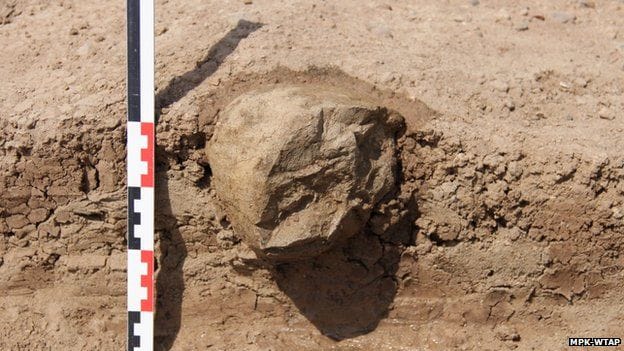The oldest tools in the world have been discovered in Kenya, according to science journal Nature.
Keep Up With Face2Face Africa On Facebook!
The tools are reportedly 700,000 years older than the Oldowan tools found in Tanzania.
In fact, while the Oldowan tools date back 2.6 million years, the tools that were found along northern Kenya’s Lake Turkana are said to be 3.3 million years old.
Dr. Nick Taylor of France’s the National Centre of Scientific Research and the Netherlands’ University of Leiden, says of the discovery, “They are significantly earlier than anything that has been found previously.
“It’s really quite astonishing to think what separates the previous oldest site and this site is 700,000 years of time. It’s monumental.”
Researchers reportedly found the tools after they took a wrong turn as they crossed the area around the lake in 2011.
By 2012, researchers unearthed 149 tools, and in 2014, they found even more.
Scientists used the volcanic ash and minerals around the tools to date them.
But what types of tools were found?
Hammers, anvils, and sharp flakes of stone that were likely used as knives.
Dr. Taylor explains, “The very largest one we have weighs 15kg, which is massive.
“On this piece, it doesn’t show the signs of actually having been flaked to produce other artifacts… rather, it was probably used as an anvil.
“It probably rested in the soil and the other cobbles brought to the site, which were intended to be smashed apart to make tools, were struck against this large anvil.”
One question scientists haven’t been able to answer, though, is who made the tools.
Initially, scientists thought the human and ape-like species Homo habilis or “the handy man” was the earliest ancestor to use tools.
But with this most recent discovery predating that species by about 1 million years, that theory is unlikely.
In addition, scientists believed that the so-called early ancestors of humans, such as the aforementioned Homo habilis and Kenyathropus platypos, weren’t “particularly intelligent” due to their small brains.
However, either the named hominids are smarter than scientists thought or someone else is responsible.
Dr. Taylor speculates, “There are a number of possible candidates at present. There was a hominin called Kenyanthropus platyops, which has been found very close to where the Lomekwi 3 tools are being excavated. And that hominin was around at the time the tools were being made.
“More widely in the East African region there is another hominin, Australopithecus afarensis (pictured), which is famously known from the fossil Lucy, which is another candidate.”
One hominid that was curiously not referred to by the interviewed scientists as a possible candidate is the recent discovery of a previously unknown hominid’s lower jawbone in neighboring Ethiopia that effectively pushed back the history of humans at least 400,000 years.
As Face2Face Africa previously reported:
The existence of the fossil immediately countered scientists’ ideas of how old humans are and how we came in to being — scientifically speaking.
“Previously, the oldest fossil attributed to the genus Homo was an upper jaw from Hadar, Ethiopia, dated to 2.35m years ago,” says the Director of Arizona State University’s Institute of Human Origins William Kimble.
“So this new discovery pushes the human line back by 400,000 years or so, very close to its likely (pre-human) ancestor. Its mix of primitive and advanced features makes the Ledi jaw a good transitional form between (Lucy) and later humans.”
Either way, University College London’s Dr. Ignacio de la Torre said of the tool find to the BBC, “It’s the most important discovery in the last 50 years.”
“It suggests that species like Australopithecus might have been intelligent enough to make stone tools — that they had the cognitive and manipulative abilities to carry tasks like this out.”
Or maybe the named hominids aren’t responsible for the creation of the tools at all.
SEE ALSO: Archaeologists Discover Tomb Of Unknown Queen In Egypt














